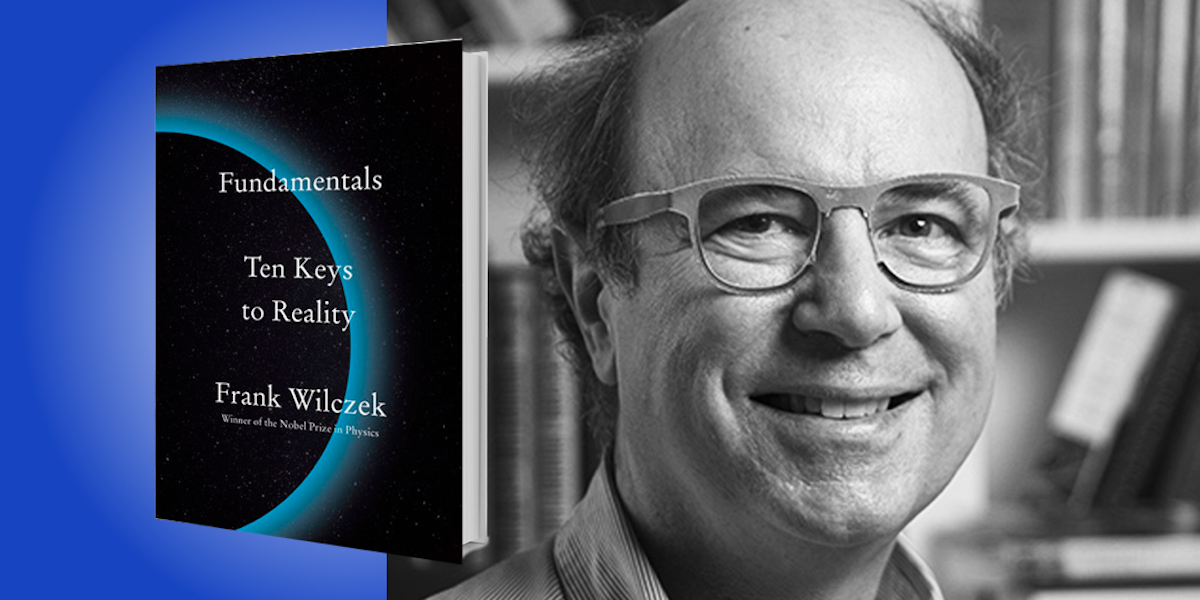Frank Wilczek is a theoretical physicist and mathematician who shared the Nobel Prize in Physics in 2004. He’s written hundreds of scholarly articles and several books of popular science, and has a regular science column in the Wall Street Journal. He teaches at the Massachusetts Institute of Technology, Arizona State University, and Stockholm University.
Below, Frank shares 5 key insights from his new book, Fundamentals: Ten Keys to Reality. Download the Next Big Idea App to enjoy more audio “Book Bites,” plus Ideas of the Day, ad-free podcast episodes, and more.
1. The physical world is amazingly comprehensible.
The equations that express how matter behaves can be expressed in a short and simple computer program. The stuff that we’re made of, and that we deal with in biology, chemistry, geology, astrophysics, and all forms of engineering, is built up from a very few radically simple building blocks called electrons, photons, quarks, and gluons, which we can describe completely. It would be difficult to overstate how comprehensive, well-tested, and accurate the equations that we use to describe those entities are.
These equations have repeatedly proven themselves in impressive technologies. The Global Positioning System, or GPS, relies on the equations of quantum mechanics and general relativity. Magnetic Resonance Imaging (MRI), a workhorse of modern medicine, uses magnetic fields generated by superconducting currents to tickle nuclear spins, and then decodes those spins to make images of our body’s interiors.
These achievements would be inconceivable, literally, without our deep understanding of matter. As Albert Einstein reportedly said, “The most incomprehensible thing about the physical world is that it is comprehensible.”
2. The world is amazingly strange.
While the equations that describe our universe are simple and comprehensible, they are not intuitive. The fundamental laws are expressed in a very different language than we use for everyday purposes. They do not contain concepts like soft or hard, hot or cold, love, will, or desire. Instead, they deal in mass, charge, spin, and quantum fields. This presents a tremendous challenge to the human imagination: to reconcile the everyday experience of the world that we share with the fundamental structure of reality as revealed by science.
“Science tells us what things are, but not what they should be.”
It also adds new meaning to everything from rainbows to iPhones. When I see a rainbow, I think about not only how beautiful the rainbow is, but how beautiful it is that light is refracted by different amounts because of the way that atoms in water respond to being tickled by electromagnetic waves. Knowing what’s going on under the hood is a tremendous spur to imagination. It gives our imaginations a workout each and every day.
3. Great answers empower great questions.
We know a lot, but that enables us to not know even more—to be more ambitious in the kinds of questions we ask. How does mind emerge from matter? How did the world begin? Our hard-won knowledge of fundamentals allows us to pose these classic questions sharply, and to make progress toward answering them. And as we learn things, we discover completely new questions and challenges. For example, astronomers have discovered that there’s a form of matter that occurs in great abundance throughout the universe, the so-called dark matter. What is it made of? Based on our knowledge, we can make guesses about what it is, but we don’t really know yet. It’s a wonderful example of how our knowledge empowers us to ask new questions and grope toward answers. A phrase that captures this process is, “Yesterday’s sensation is today’s calibration and tomorrow’s foundation.”
4. Science is not a theory of everything.
In learning how the physical world works, we discover there are limits, both practical and fundamental, to how far our understanding can penetrate. Quantum theory introduces probability and uncertainty into our description of the world in a weird but unavoidable way. Although the theory’s equations are perfectly definite, we can have only partial knowledge of the quantities that those equations contain. Already in classical physics, there’s a related problem, sometimes called chaos theory, which adds to the uncertainty that quantum mechanics introduces. The problem is that many equations greatly magnify small uncertainties in our knowledge over time. This is what makes it difficult to predict the weather far in advance—it’s sometimes called the butterfly effect, because a butterfly fluttering far away can affect the weather in drastic ways, a few weeks or even months later. So both the uncertainty introduced by quantum mechanics and its magnification according to classical physics often limit our ability to make accurate predictions about the future.
“The technical knowledge is there for our species to thrive, but we will need wisdom and imagination to live up to our potential.”
There are other ways in which science presents an incomplete picture of the world. To cope with complex systems, such as human beings or stock markets, we need concepts like love and enthusiasm, concepts that are not contained in the scientific fundamentals but have to be introduced and considered on their own. Finally, and most importantly, science tells us what things are, but not what they should be. There is no logic that can take you from is to ought, as the philosopher David Hume argued persuasively.
5. Our future as a species could be glorious, or not.
Our ability to control matter, energy, and information to create wealth and expand human horizons has advanced exponentially in recent decades, with no end in sight. There is vastly more material on Earth than we put to useful purposes at present. Our sun puts out much more energy than we use, and it will continue to do so for a very long time. We could, in principle, combine things and manufacture useful complexity on a scale that present-day engineering does not approach. So it’s our creativity, not the physical world, that is the practical barrier to a future for humanity that’s richer and smarter than the present.
But continuing success is not inevitable. Catastrophic climate change and nuclear warfare could set us back by many decades, or even permanently. The recent pandemic reminds us that, in Friedrich Schiller’s words, “Against stupidity, the gods themselves struggle in vain.” The technical knowledge is there for our species to thrive, but we will need wisdom and imagination to live up to our potential.
For more Book Bites, download the Next Big Idea App today:

































